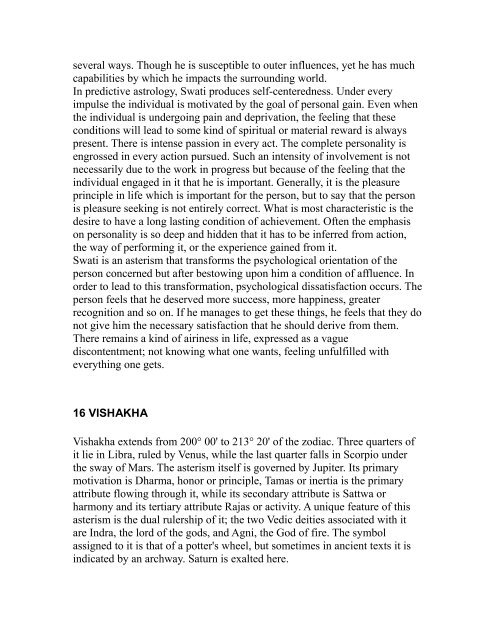Astrological Mythology The Meaning of ... - Mandhata Global
Astrological Mythology The Meaning of ... - Mandhata Global
Astrological Mythology The Meaning of ... - Mandhata Global
You also want an ePaper? Increase the reach of your titles
YUMPU automatically turns print PDFs into web optimized ePapers that Google loves.
several ways. Though he is susceptible to outer influences, yet he has much<br />
capabilities by which he impacts the surrounding world.<br />
In predictive astrology, Swati produces self-centeredness. Under every<br />
impulse the individual is motivated by the goal <strong>of</strong> personal gain. Even when<br />
the individual is undergoing pain and deprivation, the feeling that these<br />
conditions will lead to some kind <strong>of</strong> spiritual or material reward is always<br />
present. <strong>The</strong>re is intense passion in every act. <strong>The</strong> complete personality is<br />
engrossed in every action pursued. Such an intensity <strong>of</strong> involvement is not<br />
necessarily due to the work in progress but because <strong>of</strong> the feeling that the<br />
individual engaged in it that he is important. Generally, it is the pleasure<br />
principle in life which is important for the person, but to say that the person<br />
is pleasure seeking is not entirely correct. What is most characteristic is the<br />
desire to have a long lasting condition <strong>of</strong> achievement. Often the emphasis<br />
on personality is so deep and hidden that it has to be inferred from action,<br />
the way <strong>of</strong> performing it, or the experience gained from it.<br />
Swati is an asterism that transforms the psychological orientation <strong>of</strong> the<br />
person concerned but after bestowing upon him a condition <strong>of</strong> affluence. In<br />
order to lead to this transformation, psychological dissatisfaction occurs. <strong>The</strong><br />
person feels that he deserved more success, more happiness, greater<br />
recognition and so on. If he manages to get these things, he feels that they do<br />
not give him the necessary satisfaction that he should derive from them.<br />
<strong>The</strong>re remains a kind <strong>of</strong> airiness in life, expressed as a vague<br />
discontentment; not knowing what one wants, feeling unfulfilled with<br />
everything one gets.<br />
16 VISHAKHA<br />
Vishakha extends from 200° 00' to 213° 20' <strong>of</strong> the zodiac. Three quarters <strong>of</strong><br />
it lie in Libra, ruled by Venus, while the last quarter falls in Scorpio under<br />
the sway <strong>of</strong> Mars. <strong>The</strong> asterism itself is governed by Jupiter. Its primary<br />
motivation is Dharma, honor or principle, Tamas or inertia is the primary<br />
attribute flowing through it, while its secondary attribute is Sattwa or<br />
harmony and its tertiary attribute Rajas or activity. A unique feature <strong>of</strong> this<br />
asterism is the dual rulership <strong>of</strong> it; the two Vedic deities associated with it<br />
are Indra, the lord <strong>of</strong> the gods, and Agni, the God <strong>of</strong> fire. <strong>The</strong> symbol<br />
assigned to it is that <strong>of</strong> a potter's wheel, but sometimes in ancient texts it is<br />
indicated by an archway. Saturn is exalted here.
















